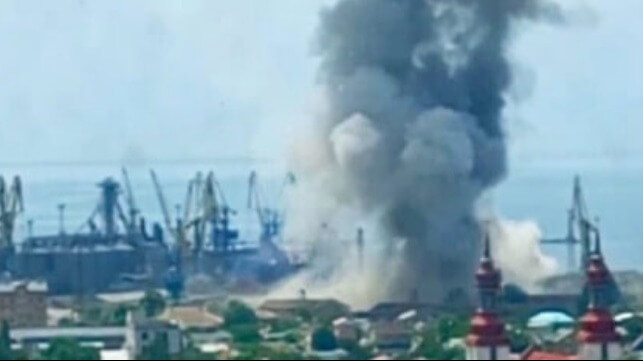Russia-Ukraine Tensions Rise as Ports are Shelled and Ships Blocked

Maritime interests are again caught in the crossfire of the war between Russia and Ukraine. There are new reports of shelling in ports on both sides of the conflict as well as renewed efforts by Russia at blocking the ships for the grain exports from Ukrainian ports. The lower house of the Russian Parliament State Duma this week also adopted a law denouncing a Russian-Ukrainian treaty governing the joint use of the Sea of Azov and the Kerch Strait.
Videos surfaced on social media on Friday morning showing explosions in the port city of Berdyansk on the Sea of Azov in the annexed areas of Crimea in eastern Ukraine. Members of the Russian-installed government took to the Telegram social media channel blaming Ukraine for the explosions saying the city and specifically the port area was being shelled.
Reports said that Russian-controlled ships had recently arrived in the port to remove cargoes of grain and metals stored in the port and looted from Ukraine. It was unclear if the shelling or missiles was directed at the ships, but on Telegram the officials showed pictures saying the ships had fled the port for their safety.
On the afternoon of 2 June an explosion occurred at the port in occupied Berdiansk#UkraineWarVideos#UkraineWarNews pic.twitter.com/VT6o8BVVGt
— Paul Healey ???????????????? (@Paul_TheNewf) June 2, 2023
Earlier this week, Ukraine accused Russia of damaging areas in the port of Odesa as Russia increased its attacks with missiles and drones across the country. Parts of the Port of Odesa were reportedly set on fire after a drone attack reported on Monday with officials highlighting that Odesa’s port is part of the grain deal which seeks to protect port infrastructure and provide safe corridors for the exports.
Ukraine continues to say that despite the recent agreement to extend the grain deal for two months that Russia is taking actions to block the exports. Data from the Joint Coordination Center (JCC) in Istanbul shows that no ships have been permitted to proceed inbound to Ukraine for the past two days. Only one ship a day this week has departed from the ports of Odessa and Chornomorsk loaded with foodstuff exports. The UN reports since May 24 that the number of inspection teams at the JCC has been reduced from three to two.
“The Russian Federation has informed the JCC of its decision to limit registrations to the port of Yuzhny/Pivdennyi as long as ammonia is not exported. And currently, it is not,” a UN spokesperson said during a briefing in New York on June 1. “The limited registrations and reduced inspection teams contributed to the drop of the average daily inspection rate down to three. This is a very serious situation.”
Separately, Reuters is also quoting sources saying that the Russian port of Taman on the peninsula separating the Black Sea and Sea of Azov is likely going to suspend shipments of liquefied petroleum gas (LPG). The unmanned sources cited the increasing danger from drones and the highly explosive nature of the gas exports to the news agency. According to Reuters, last year the complex shipped 328,000 tonnes of Russian and Kazakh LPG.
These moves come as the Russian Parliament moved to end a 2003 treaty between the two countries that guaranteed free passage for Russian and Ukrainian merchant and naval vessels in the Sea of Azov and the Kerch Strait. Earlier this year, President Vladimir Putin signaled Russian intention to denounce the treaty. In May, Putin submitted the treaty denunciation bill in the lower house and appointed Deputy Minister of Foreign Affairs Mikhail Galuzin to oversee the review process by the Federal Assembly.

that matters most
Get the latest maritime news delivered to your inbox daily.
“With the ongoing war and subsequent Russian control in Donetsk, Zaporizhzhia, and Kherson regions, it has given rise to a fundamentally new situation around the Sea of Azov and the Kerch Strait. The shorelines of the water bodies now fully belong to Russia. In this regard, Russia had to terminate the treaty now that Ukraine has lost the status of a littoral state with respect to the aforementioned maritime zones,” Galuzin said justifying the act.
In February, Kyiv terminated its cooperation with Russia on the Sea of Azov, citing blatant violations of the treaty conditions. Ukraine accused Russia of treating the Sea of Azov as a de facto inland sea, usurping the rights and jurisdiction of Ukraine as a coastal state to the water body. Experts said that the denunciation of the treaty is likely to jeopardize the operations of Ukraine’s ports in the affected regions, further straining the Black Sea grain export deal.
